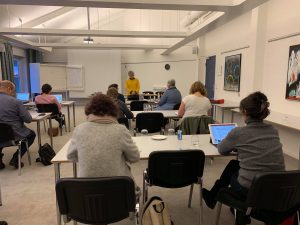Teaching and Learning
Here below you can find the links to the different pages describing our school program
Teaching and learning
 The overall aim of the whole atmosphere of the learning environment is to create a room of confidence, trust and respect, no matter whether it takes place physically or digitally.
The overall aim of the whole atmosphere of the learning environment is to create a room of confidence, trust and respect, no matter whether it takes place physically or digitally.
Sometimes the theoretical elements form the basis for the practical ones, at other times it’s the other way around, or they are intertwined.
During the lessons the teaching will vary in different ways according to each specific subject. Normally you will find presentations with new scientific knowledge and research, facts, examples, analysis, comparisons, reasons and critical reflection – sometimes inductively, at other times deductively.
Different ways of working during the lessons will support the teaching, e.g. role plays, drawings, the students’ reflection, training and evaluation – alone, in pairs, in set teams, in group work and/or in plenary – often supported by the teacher as supervisor.
At certain set times outside the lessons the contact persons will give their students individual response on their writing and personal development.
The practical element consists of an opportunity for the students to gain insight in their own possibilities as well as limits, and to work through their own issues cognitively as well as emotionally, e.g. losses and traumas, so that they themselves discover and experience their own stress fields and learn to contain loss of control. Thus they will learn to create and develop a healing room and relationship around people in need. All through this process the students are guided by their supervisors.
The students’ critical reflection and analysis of self and the work is a highly important element in their learning process. It is viewed as an ability to analyze, reflect upon and critique
- their own ideas and arguments and those of others
- their own work and self awareness
- the relation between theory and practice
- the use of own received counseling and supervision – internally as well as externally.
The modules of being together physically and residentially give the students rich opportunities for collaborated interaction in the professional field of IPSICC psychotherapists. They can acquire and train systemic skills and further systemic development.
The students’ learning is further supported by individual studying and reflecting of books, bimonthly reports and assignments. Overall aspects within these different individual tasks are to interact and integrate psychotherapeutic knowledge and understanding with their own insights, experiences and other knowledge about the issues, and to acknowledge and state their reasons for issues they see differently. Personal analysis of and reflection on effects of counseling both received and given add to their personal development. Awareness of their spiritual life provides their basis and perspective.